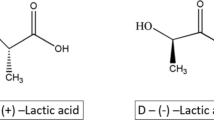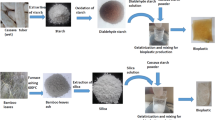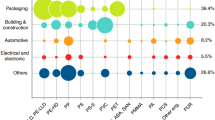Abstract
This work is aimed to study the suitability of cardanol and its derivatives as plasticizers for poly(lactic acid), PLA. Differential scanning calorimetry (DSC) was used to assess the plasticizing effectiveness of cardanol (CARD) and its derivatives, cardanol acetate and epoxidated cardanol acetate, comparing the results with those obtained with a commercially available plasticizer, poly (ethylene glycol), PEG, with an average molecular weight of 400 g mol−1. Measurement of the glass transition temperature highlighted that, among the tested cardanol derivatives, neat cardanol is the most effective plasticizer for PLA. In fact, the glass transition temperature of PLA plasticized by CARD is only slightly higher than that of PLA plasticized by PEG. This is attributed to the lower compatibility between PLA and CARD compared to PLA and PEG, as estimated by the interaction radius. Therefore, cardanol could represent a technically valid, economic, and largely available plasticizer for PLA. Moreover, DSC, an X-ray diffraction analysis, showed that, compared to PEG, the addition of CARD involves a limited increase of the rate of crystallization, even in this case, due to its lower compatibility with PLA. Dynamic mechanical analysis showed that, below glass transition, PEG is able to reduce the stiffness of PLA by a higher extent. However, as the temperature increases, retention of the shear modulus of PEG-plasticized PLA is much higher than that of CARD-plasticized PLA. As a consequence, above glass transition, the stiffness of CARD-plasticized PLA becomes lower than that of PEG-plasticized PLA. Therefore, despite its lower compatibility with PLA, CARD can impart to plasticized PLA lower modulus compared to PEG, when the plasticizer content is high enough to reduce the glass transition below room temperature.









Similar content being viewed by others
References
Pantani R, De Santis F, Sorrentino A, De Maio F, Titomanlio G. Crystallization kinetics of virgin and processed poly(lactic acid). Polym Degrad Stab. 2010;95(7):1148–59.
Martino VP, Ruseckaite RA, Jiménez A. Thermal and mechanical characterization of plasticized poly (l-lactide-co-D, l-lactide) films for food packaging. J Therm Anal Calorim. 2006;86:707–12.
Greco A, Gennaro R, Timo A, Bonfantini F, Maffezzoli A. A comparative study between bio-composites obtained with opuntia ficus indica cladodes and flax fibers. J Polym Environ. 2013;21(4):910–6.
Tábi T, Suplicz A, Czigány T, Kovács JG. Thermal and mechanical analysis of injection moulded poly(lactic acid) filled with poly(ethylene glycol) and talc. J Therm Anal Calorim. 2014;118:1419–30.
Lim LT, Auras R, Rubino M. Processing technologies for poly(lactic acid). Prog Polym Sci. 2008;33:820–52.
Jamshidian M, Tehrany EA, Imran M, Jacquot M, Desobry S. Poly-Lactic Acid: production, applications, nanocomposites, and release studies. Compr Rev Food Sci F. 2010;9(5):552–71.
Ge H, Yang F, Hao Y, Wu G, Zhang H, Dong L. Thermal, mechanical, and rheological properties of plasticized poly(l-lactic acid). J Appl Polym Sci. 2013;127(4):2832–9.
Rasal RM, Janorkarc AV, Hirt DE. Poly(lactic acid) modifications. Prog Polym Sci. 2010;35:338–56.
Hsieh YT, Kuo NT, Woo EM. Thermal analysis on phase behavior of poly(l-lactic acid) interacting with aliphatic polyesters. J Therm Anal Calorim. 2012;107:745–56.
Vieira MG, Altenhofen da Silva M, Oliveira dos Santos L, Beppu M. Natural-based plasticizers and biopolymer films: a review. Eur Polym J. 2011;47:254–63.
Martin O, Averous L. Poly(lactic acid): plasticization and properties of biodegradable multiphase systems. Polymer. 2001;42:6209–19.
Burgos N, Martino VP, Jiménez A. Characterization and ageing study of poly(lactic acid) films plasticized with oligomeric lactic acid. Polym Degrad Stab. 2013;98(2):651–8.
Ionescu M, Wan X, Bilic N, Petrovic ZS. Polyols and rigid polyurethane foams from cashew nut shell liquid. J Polym Environ. 2012;20:647–58.
Sakulsaknimitr W, Wirasate S, Pipatpanyanugoon K, Atorngitjawat P. Structure and thermal properties of polyurethanes synthesized from cardanol diol. J Polym Environ. 2015;23:216–26.
Besteti MD, Souza FG Jr, Freire DMG, Pinto JC. Production of core-shell polymer particles-containing cardanol by semibatch combined suspension/emulsion polymerization. Polym Eng Sci. 2014;54(5):1222–9.
Greco A, Ferrari F, Del Sole R, Maffezzoli A. Use of cardanol derivatives as plasticizers for PVC. J Vinyl Addit Technol. 2016. https://doi.org/10.1002/vnl.21585.
Greco A, Ferrari F, Velardi R, Frigione M, Maffezzoli A. Solubility and durability of cardanol derived plasticizers for soft PVC. Int Polym Proc. 2016;31(5):577–86.
Greco A, Ferrari F, Maffezzoli A. Ultraviolet and thermal stability of soft poly(vinylchloride) plasticized with cardanol derivatives. J Clean Prod. 2017;164:757–64.
Greco A, Ferrari F, Maffezzoli A, Delogu P, Velardi R, Timo A, Tarzia A, Marseglia A, Calò M. Solubility and durability of cardanol derived plasticizers for soft PVC. Environ Eng Manag J. 2016;15(9):1989–95.
Greco A, Maffezzoli A. Cardanol derivatives as innovative bio-plasticizers for poly-(lactic acid). Polym Degrad Stab. 2016;132:213–9.
Greco A, Brunetti D, Renna G, Mele G, Maffezzoli A. Plasticizer for poly(vinyl chloride) from cardanol as a renewable resource material. Polym Degrad Stab. 2010;95(11):2169–74.
Calò E, Greco A, Maffezzoli A. Effects of diffusion of a natural derived plasticizer from soft PVC. Polym Degrad Stab. 2011;96(5):784–9.
Van Krevelen DW, Te Nijenhuis K. Properties of Polymers. 4th ed. Amsterdam: Elsevier; 2009.
Greco A, Maffezzoli A. Analysis of the suitability of polylactic acid in rotational molding. Adv Polym Technol. 2015;34(3):21505. https://doi.org/10.1002/adv.21505.
Saad GR, Elsawy MA, Aziz MSA. Nonisothermal crystallization behavior and molecular dynamics of poly(lactic acid) plasticized with jojoba oil. J Therm Anal Calorim. 2017;128:211–23.
Greco A, Gennaro R, Rizzo M. Glass transition and cooperative rearranging regions in amorphous thermoplastic nanocomposites. Polym Int. 2012;61:1326–33.
Pérez-Fonseca AA, Robledo-Ortíz JR, González-Núñez R, Rodrigue D. Effect of thermal annealing on the mechanical and thermal properties of polylactic acid–cellulosic fiber biocomposites. J Appl Polym Sci. 2016;133(31):43750.
Wunderlich B. Macromolecular physics, crystal melting, vol. 3. New York: Academic Press; 1980.
Author information
Authors and Affiliations
Corresponding author
Rights and permissions
About this article
Cite this article
Greco, A., Ferrari, F. & Maffezzoli, A. Thermal analysis of poly(lactic acid) plasticized by cardanol derivatives. J Therm Anal Calorim 134, 559–565 (2018). https://doi.org/10.1007/s10973-018-7059-4
Received:
Accepted:
Published:
Issue Date:
DOI: https://doi.org/10.1007/s10973-018-7059-4




